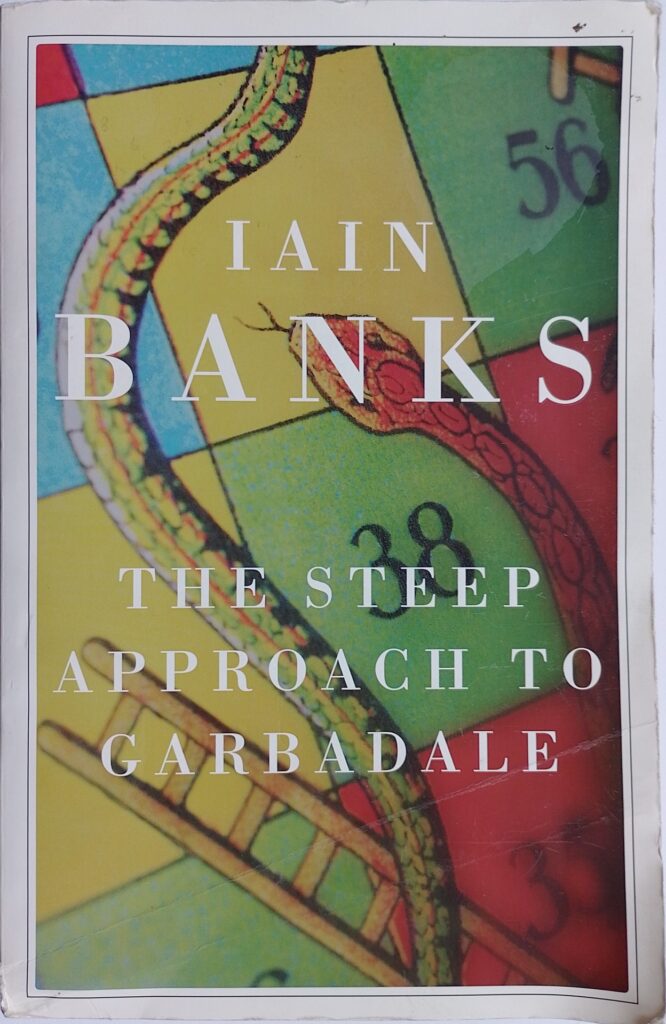First published 2007. Little Brown, paperback, 2007, pp 390, c. 120,000 words.
This is another classic Banks contemporary novel closely observing a small group of people, in this case a family who are owners of a games business. The company was founded in the nineteenth century producing a board game called Empire!, with similar playing characteristics to Monopoly. More recently it has become a highly successful computer game. An American company has already bought twenty-five percent of the business and now wants to buy the rest. The family has expanded and spread around the world, and it still owns the two estates that the founder built: one in Somerset and one in the north of Scotland – the titular Garbadale – to where the family have been summoned by the matriarch to decide on the possible sale.
Banks is particularly good at low-life. One can see the dirt and disarray, smell the booze, fags and bodies. He captures the language and the lack of aspiration. The opening here is a classic; nicely contrasted by a proudly successful member of the family trying to winkle out one who has almost slipped out of the family’s orbit, the one who turns out to be the main protagonist.
Another of the author’s great skills is humour. He is a master at observing the comic elements of life, mostly without forcing a scene or detracting from the realism. Occasionally he delivers a laugh-out-loud punchline, e.g. on p63, but which, it might be argued, is perhaps a little too slick for a fifteen-year-old. He also does sex very well. There are some quite erotic passages here, but all very tastefully done: sexy without sex, or at least without graphic sex.
The book does have its flaws. ‘Obviously’ is a word that, at least at one time, was over used by teenagers, and Banks gets that speech pattern right, but then has almost every other character use the word in the same way, even a ninety-year-old. It may have been intended as a joke, but after a while it jarred, and became an interruption to the suspension of disbelief.
The structure is complex, with numerous flashbacks. They are mostly handled well, if also interrupting the flow. Banks is trying to reveal the past events that have led to the current relationships between the family members, and as with all families, there are some very dysfunctional relationships here (of course, or one might even say ‘obviously’). Banks is no Agatha Christie however, and the main dark secret begins to become clear about halfway through. This doesn’t destroy the pleasure as it would with a Christie. It is not pretending to be a mystery story; it is more about how the present is going to be resolved in the light of understanding the past.
At a more detailed level, there are also structural complexities in points of view and even tense. This can even occur withing a paragraph, e.g. one written mostly in the first person, but which switches to the third person plural for a sentence [e.g. p115, p164]. This also jarred on occasion.
Occasionally the writing lapses into telling, such as a history of the Wopuld games. Sometimes he underestimates the reader by explaining things that were clear from what went before [p286] and after filling in an outsider on the various members of the family, the information is partly repeated later. It might have been easier to have a family tree laid out at the beginning, but that might also have been too revealing.
Sometimes Banks shares a clever idea with us. His analytic for understanding ourselves particular struck: ‘What are you trying to achieve? What is it you really want? Answer separately and diligently, then compare the gap between the two.’ [p109]. He also has a rather good description of what a ‘gap year’ is all about [p235]. Sometimes he can’t help himself from interjecting his own political point of view (left). Mostly this is done well and sometimes amusingly, if a little preachy. The sentimental postscript ending is the least realistic element of the story.
Overall this is a great read. Despite my criticism, the narrative drives on and we want to know what happens next. Banks writing style is fluid, making for (mostly) easy reading. It is a highly entertaining and well-told tale.
© William John Graham, January 2023

